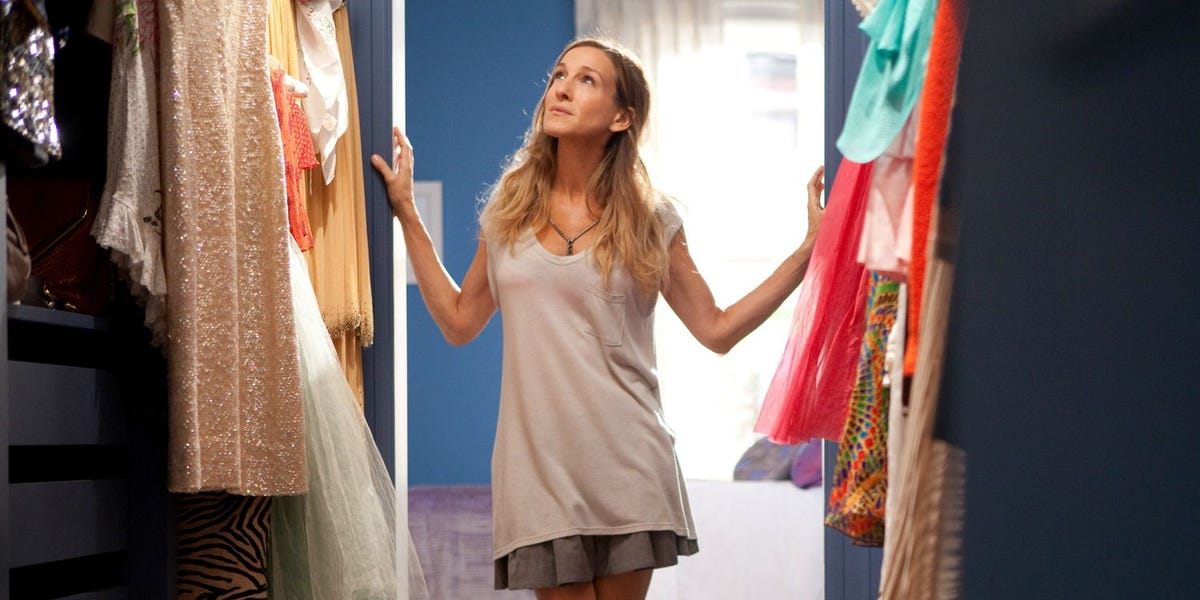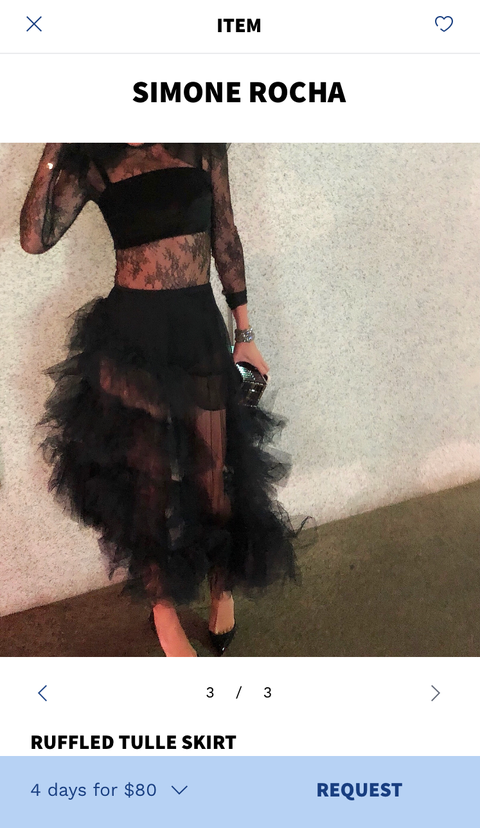Products You May Like
There’s a moment in Sex and the City when Carrie Bradshaw realizes she has $40,000 worth of shoes in her closet and no actual savings account. “I will literally be the old lady who lived in her shoes,” she laments, staring at the wreckage of beauty and waste. Violet Gross recalls similar awakenings—and subsequent panic attacks—from many of her friends, and even in her own life.
“I know so many of us had moments, even before the pandemic, when we were staring at our clothes thinking, ‘I just don’t need as much in my closet anymore,” says Gross, the founder of peer-to-peer fashion rental platform Tulerie. “How could I have better spent this money than on clothes? Could I have taken a vacation, bought a bigger apartment even? And what is the point of all this ‘stuff’ if it’s just sitting here?”
Like any fashion fan with a WiFi connection, Gross knew all about resale platforms, and sometimes used them herself. But resale didn’t account for the designer pieces Gross truly loved, yet didn’t wear that often—even though she still wanted to keep them. Meanwhile, companies that rented clothes from an anonymous warehouse were cleaning up: Rent the Runway, with its millions of cocktail dress options, and its partnerships with hotels and designers. Nuuly, which allows members to Penny Lane cosplay in ‘70s flares and antique lace tops. But Gross wanted Tulerie—a relative newbie in the rental game—to skip the offerings of a giant corporate closet, instead borrowing and loaning pieces from cool women around the world, and making both cash and connections by doing it.
“For the first part of my career, I worked in the luxury auto industry,” says Gross, who handled the books for Bentley to pay for business school at Northwestern. “I had two main things to deal with. The first was, I was often the only woman in a room full of machismo men… I learned how to stand up for myself; I learned how to work with guts and come fully prepared. The second problem I had to handle was an industry one: People would turn their cars around the same way people would turn around their wardrobes… They’d want the newest one, the fastest one, and they’d be very informed whenever something new came out… At the same time, luxury consumers would talk about switching to electric, or hybrid vehicles, because they knew it was better for the planet and it was cool, and they wanted to make the switch early. We had to figure out how to lean into that… And I realized, ‘Wait, I’m borrowing this super amazing Chanel jacket from someone, and I’m taking it for a spin the way somebody would take a really incredible car for a spin. And by sharing it, there’s way less waste, but there’s still this ultimate feeling of luxury.’”
Gross knew the idea of renting from someone else’s closet could be… well… gross. “There’s a fear around sharing clothes that I find really interesting, because dry cleaning exists!” she exclaims. “When you go to a luxury hotel, are you bringing your own sheets with you? Or are you going to sleep in a bed that other people have slept in, but then they’ve washed the sheets?” In fact, The Wall Street Journal compared Tulerie’s model to Airbnb, specifically because of its house-or-Hermès parallels. But Gross went a step further than the travel company—or any company, really. Besides rigorous cleaning protocols, she requires a personal FaceTime meeting with potential lenders and borrowers to ensure the process is totally transparent, and feels more like a group chat of style addicts than a faceless, expensive swap meet. Does it feel like a first date, I wonder?
“Yes, it’s a little awkward at first, but it’s so fun,” Gross says. “We’ve heard about all of these vacations that people have been on… Someone was going to Venice for Alta Moda and needed a dress. Someone was going to Paris and wanted to look amazing. People post questions on the site about what to wear to certain events. We’ve really created a network of friends in fashion.” She notes recent in-demand pieces have been a Simone Rocha mesh skirt, multiple Zimmermann dresses, and of course, the all-important Chanel bags that never go out of style.
“We talk about the circular fashion world, and sharing is naturally a part of that,” Gross adds. “We also try to be really vocal about using greener dry cleaners—you have to search, but they’re there!—and the importance of taking care of your pieces to begin with. You know, we’re all taught to think about ‘investment bags’ and ‘investment coats,’ but I’ll tell you my most worthwhile investment: cedar blocks. You throw them in your closet, moths won’t touch your clothes, and your favorite outfits last so much longer.”
Gross has recently returned from Paris Fashion Week—“I go as a fan and as a client of some of the designers,” she says—and mentions how circularity was put on blast at Louis Vuitton, where members of the global rights group Extinction Rebellion crashed the catwalk with signs denouncing mass consumption and waste. “I thought [the activist] had a point about overconsumption, and how overproduction is what’s going to kill the planet,” she explains. “But I also know women were looking at many runways—that Louis Vuitton runway for sure—searching for things they want to have for a long time, and not just for one season… Something going down a runway can’t be the reason you buy something. There needs to be a real purpose behind the purchase.”
And when you can’t quite bring yourself to smash the “buy” button on a hot new bag or impulse dress? “Borrow it!” Gross says. “Borrow it or share it.” After all, sharing is caring… and Gross’s arsenal of designer pieces are very easy to care about.
This content is created and maintained by a third party, and imported onto this page to help users provide their email addresses. You may be able to find more information about this and similar content at piano.io


